BLOG POSTS ARE PRELIMINARY MATERIALS CIRCULATED TO STIMULATE DISCUSSION AND CRITICAL COMMENT. THE VIEWS EXPRESSED ARE THOSE OF THE INDIVIDUAL AUTHORS. WHILE BLOG POSTS BENEFIT FROM ACTIVE UHERO DISCUSSION, THEY HAVE NOT UNDERGONE FORMAL ACADEMIC PEER REVIEW.
By Ruben Juarez, Veronica Mendoza Jachowski, Lily Solano, and the Roots Reborn Team
Background and Purpose
In February and March 2025, Roots Reborn launched Our Financial Future, a community-driven initiative to support immigrant wildfire survivors through direct financial aid, banking access, and financial education. Drawing on nearly 300 participants, the initiative employed two comprehensive, culturally attuned surveys focused on emotional well-being and immigrant experiences. This dual-survey approach captured both quantitative and qualitative data across key domains—including mental health, discrimination, employment, and cultural belonging—offering nuanced, actionable insights that transcend standard disaster response tools. The findings inform this report’s goal: to identify urgent needs, service gaps, and opportunities for targeted programming and long-term impact evaluation.
1. Mental Health and Psychosocial Well-being
Anxiety and Emotional Dysregulation
A substantial portion of participants reported ongoing psychological stress. Based on the validated Generalized Anxiety Disorder (GAD-7) scale, 25.3% of respondents showed moderate to severe anxiety symptoms—levels often linked to impaired daily functioning and increased risk of depression or physical symptoms. High rates of excessive worrying, irritability, and difficulty relaxing were common, highlighting a widespread need for accessible, culturally responsive mental health care.
Anxiety Severity Classification Based on GAD-7
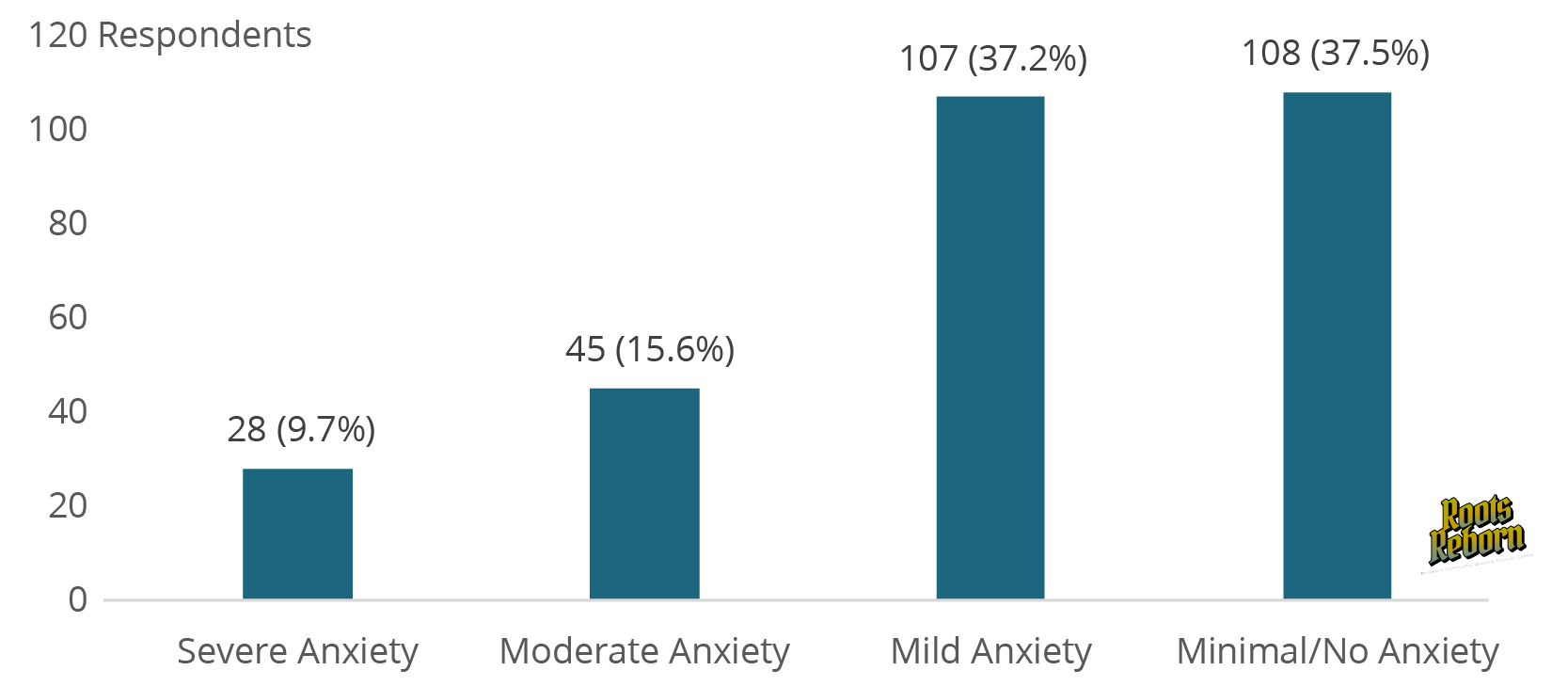
Depression Severity and Emotional Exhaustion
The Center of Epidemiologic Studies Depression Scale, 10-item version (CES-D-10) scale revealed that 46% of respondents reported mild to severe depressive symptoms. Common issues included fatigue, social withdrawal, and a sense of hopelessness. These patterns suggest that emotional distress goes beyond short-term stress and may reflect deeper trauma or long-term adjustment challenges.
Depression Severity Classification Based on CES-D 10
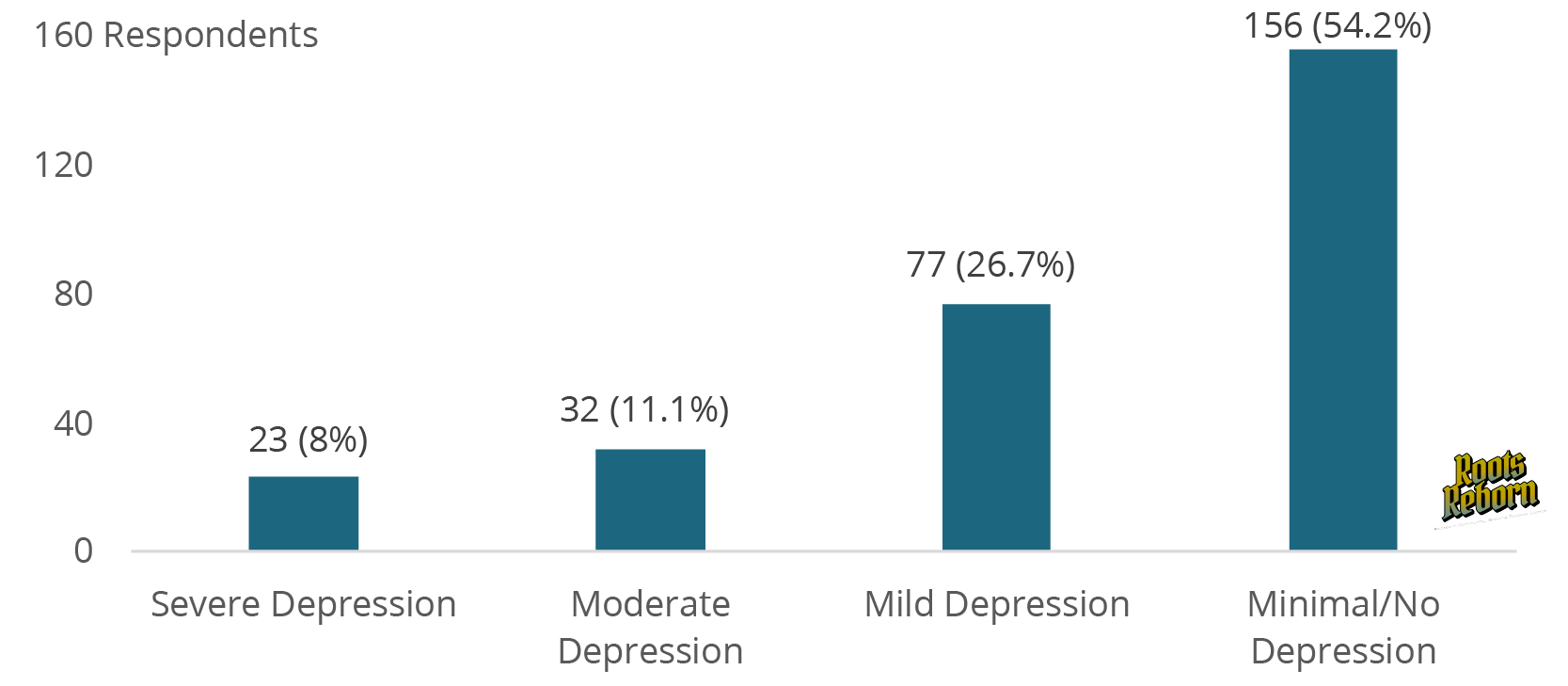
2. Structural Barriers and Health Determinants
Health Access and Insurance Gaps
While many respondents reported coverage through the Kaiser HHAP (40%) or employer-sponsored plans (30%), nearly 1 in 6 (17.4%) had no health insurance at all. This gap is significantly higher than the uninsured rate for Maui county of about 5%. This gap —compounded by immigration status, language barriers, and financial insecurity— likely leads to delayed care, self-treatment, or complete avoidance of the healthcare system. These concerns are echoed in responses citing cost, language difficulties, and fear of documentation checks as key barriers to access.
Primary Source of Health Insurance
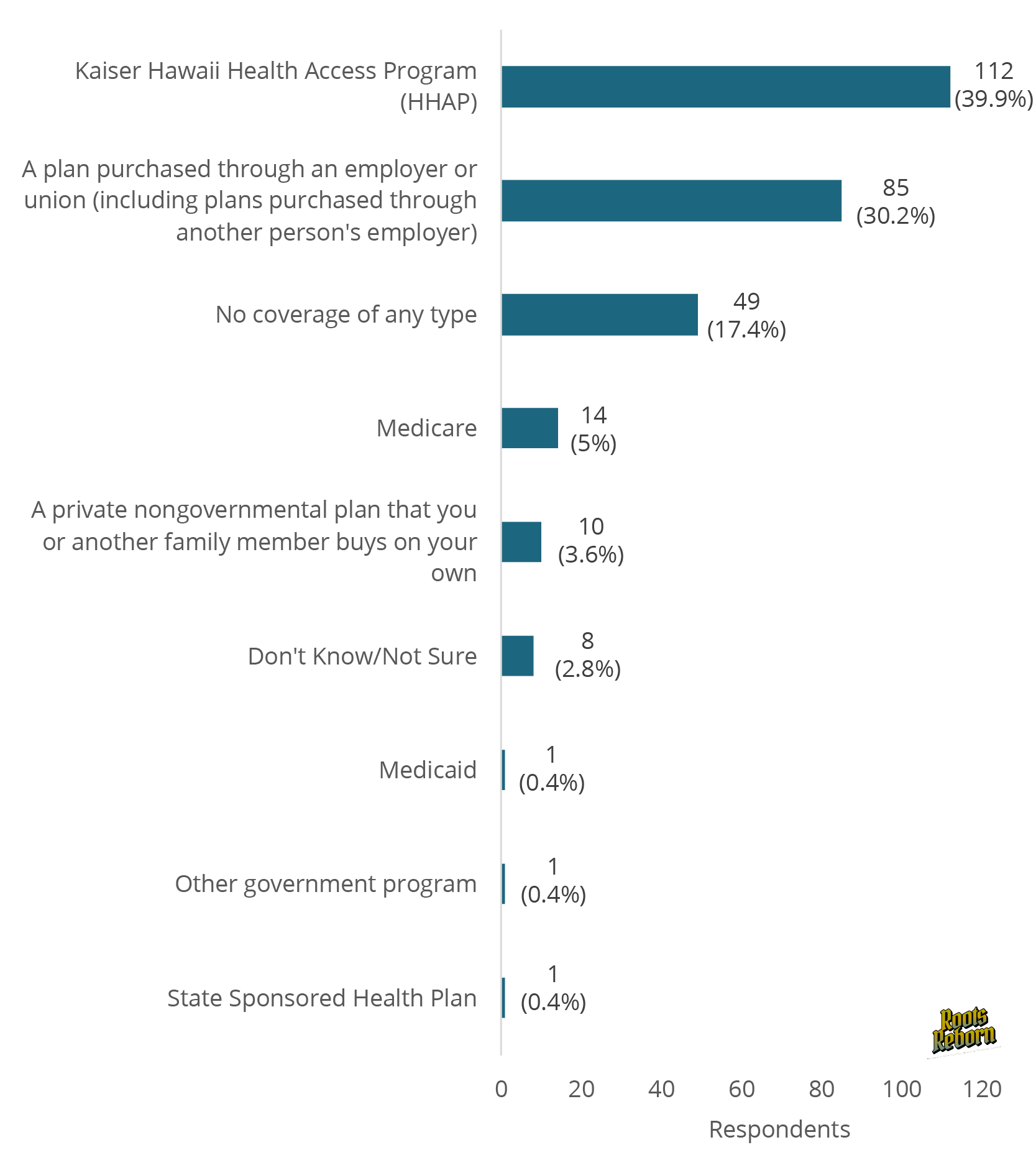
Stress and Unmet Needs After Migration
When comparing self-reported health after migration versus after the wildfire, respondents were more likely to report health improvements following migration. However, nearly 50% still experience high levels of stress related to immigration uncertainty and meeting basic needs like housing, food, and employment. This ongoing stress threatens both individual well-being and long-term community integration.
Comparing Stress Related to Immigration and Basic Needs
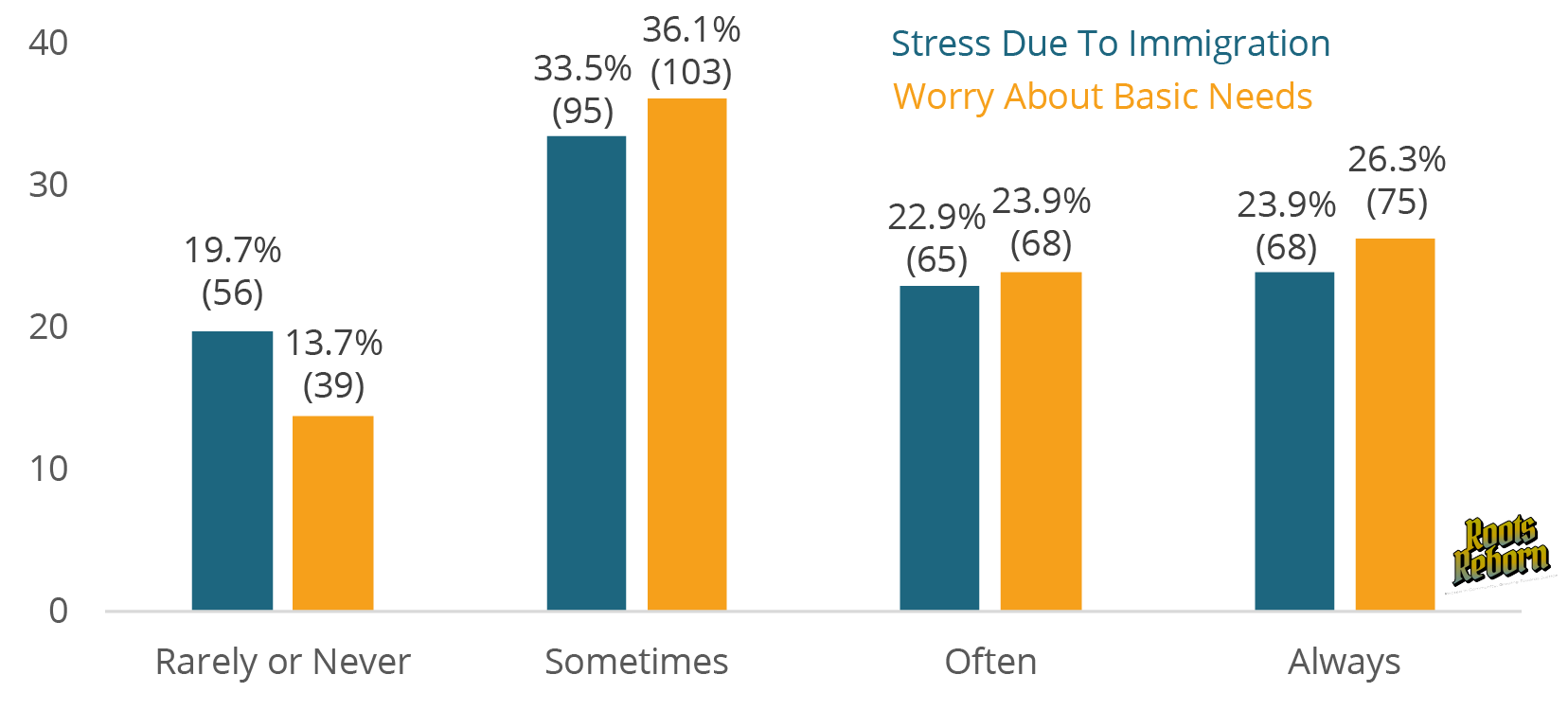
3. Economic Vulnerability and Housing Insecurity
Precarious Employment and Income Instability
Survey responses reflect a highly informal and unstable labor market. Most participants work in low-wage, non-unionized jobs—often seasonal or gig-based—in sectors like hospitality, domestic work, and landscaping. Critically, 20.5% reported incomes insufficient to meet basic needs, and another 55% said their income only partially covers necessities, highlighting deep and widespread economic insecurity.
Sufficiency of Resources for Essential Living
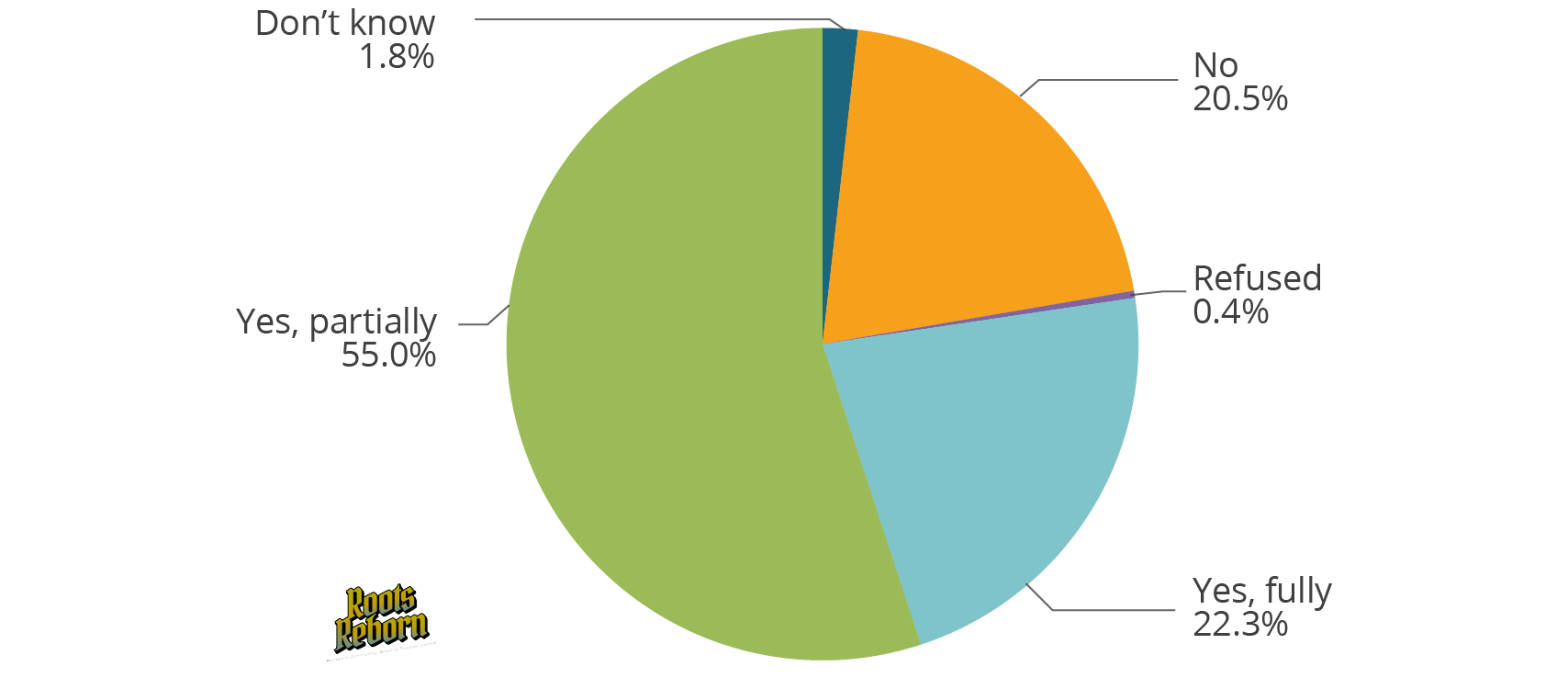
Housing Displacement After the Wildfire
The Maui wildfire continues to disrupt housing stability. Nearly 60% of respondents have moved three or more times since the disaster, and over half experienced homelessness during the recovery. As of the survey, 3.5% remain unhoused, pointing to an ongoing crisis that intersects with trauma, safety, and emotional well-being.
Post-Fire Relocations
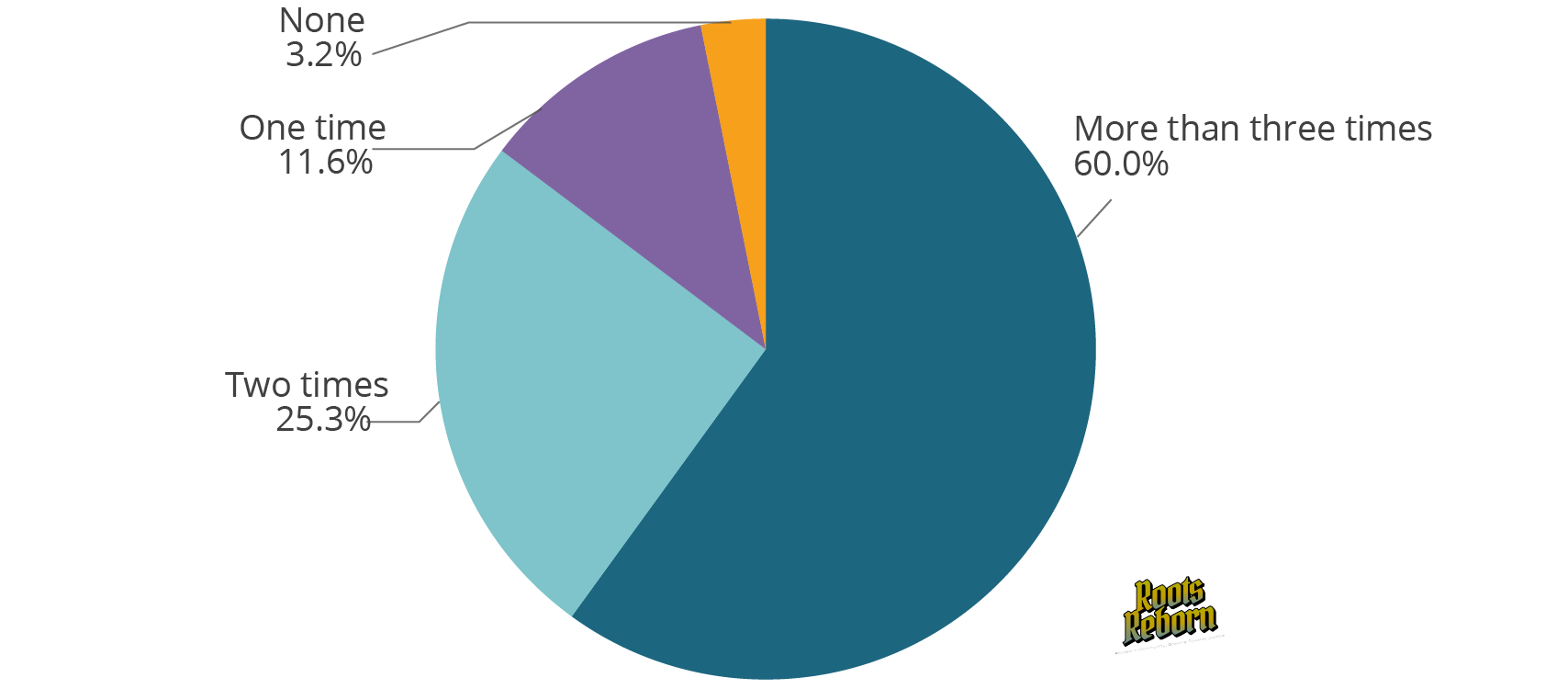
Post-Fire Houselessness Experience
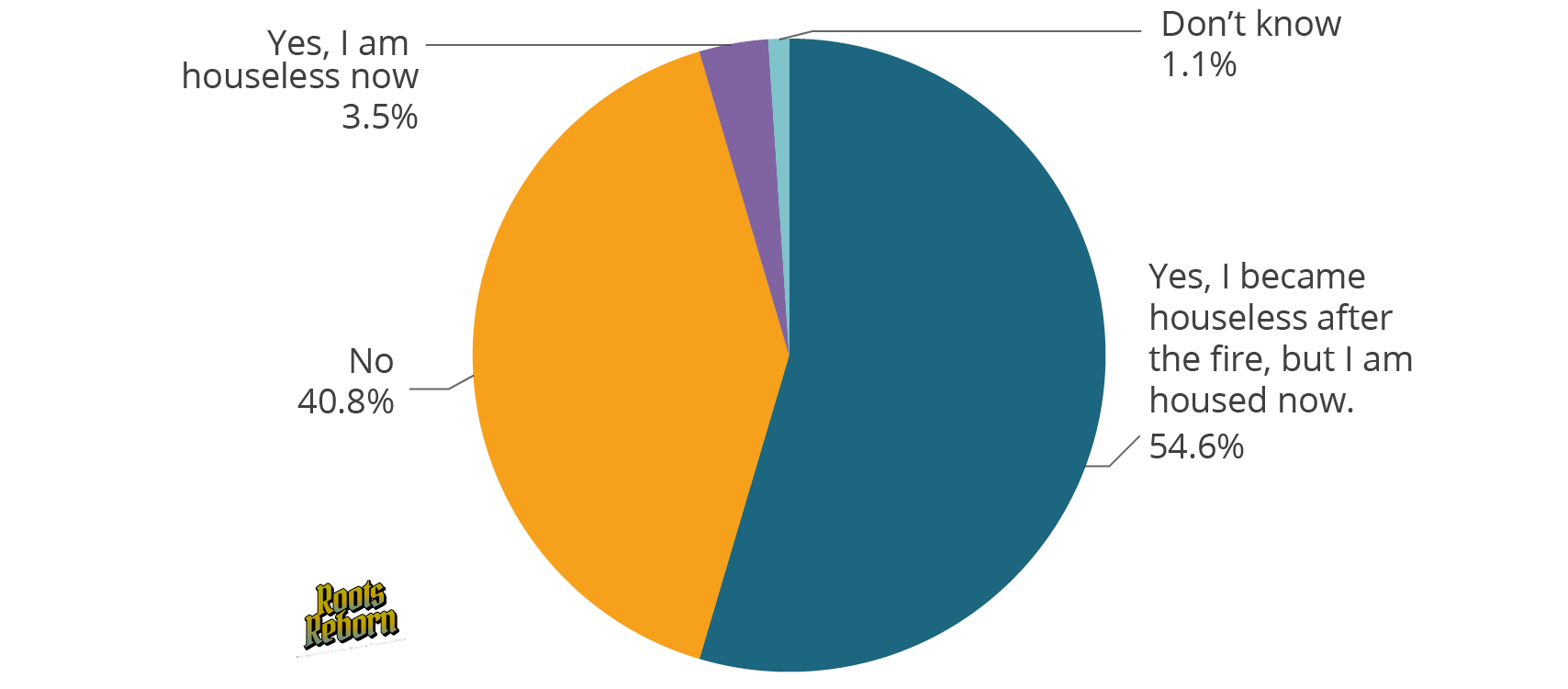
4. Institutional Trust, Discrimination, and Access Barriers
Respondents showed strong trust in local institutions: 78% for the State of Hawai‘i, 84% for the Red Cross, and 78% for Maui County. However, only 32% trusted FEMA, and nearly 68% reported uncertainty or distrust—highlighting Roots Reborn’s potential to serve as a reliable, community-based bridge between immigrants and federal aid.
Trust in Institutions
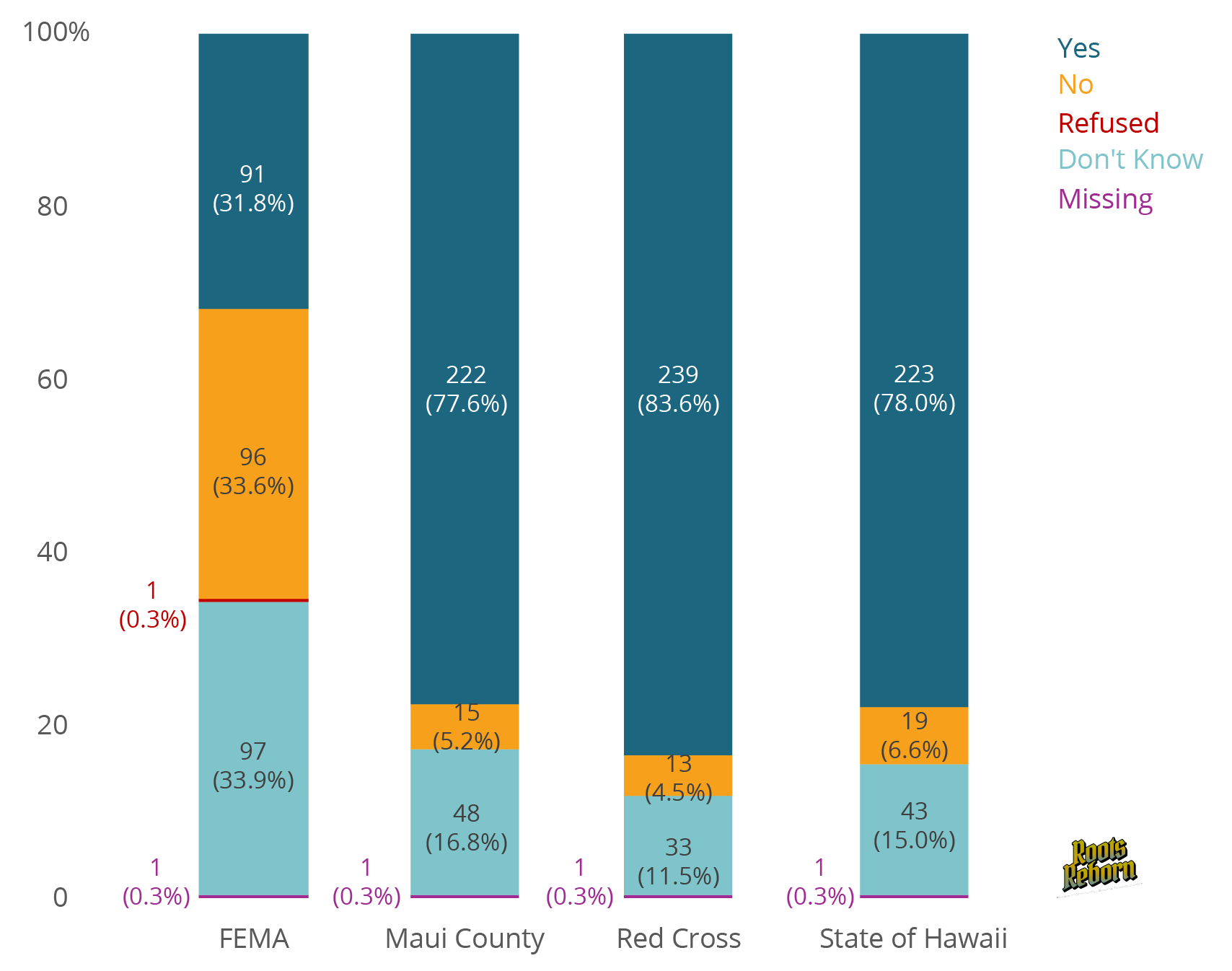
Discrimination emerged as a growing concern: 31.1% of respondents reported experiencing discrimination after arriving in Maui, nearly double the pre-migration rate of 16.4%. While 64.7% reported no such experience, this shift underscores new social barriers tied to language, race, or immigrant status.
Perceived Discrimination: Before and After Migration
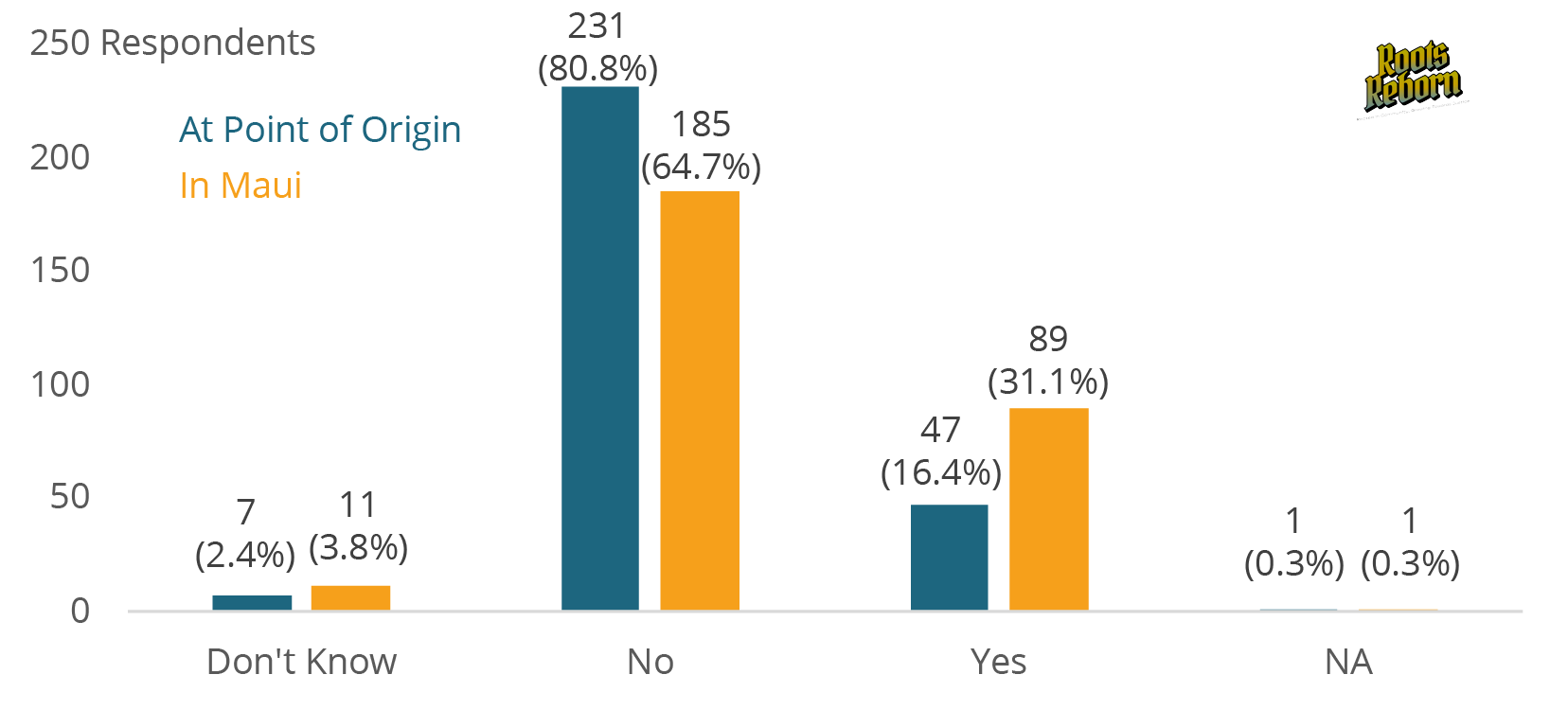
Barriers to healthcare access were widespread. The most cited were language barriers (35.7%), cost (28.9%), and legal fears or trust concerns (5.6–20.3%). Open-text responses added further context, with individuals citing issues like lack of insurance, past negative experiences, and confusion over eligibility—highlighting how structural and psychological barriers intersect.
Barriers to Accessing Healthcare
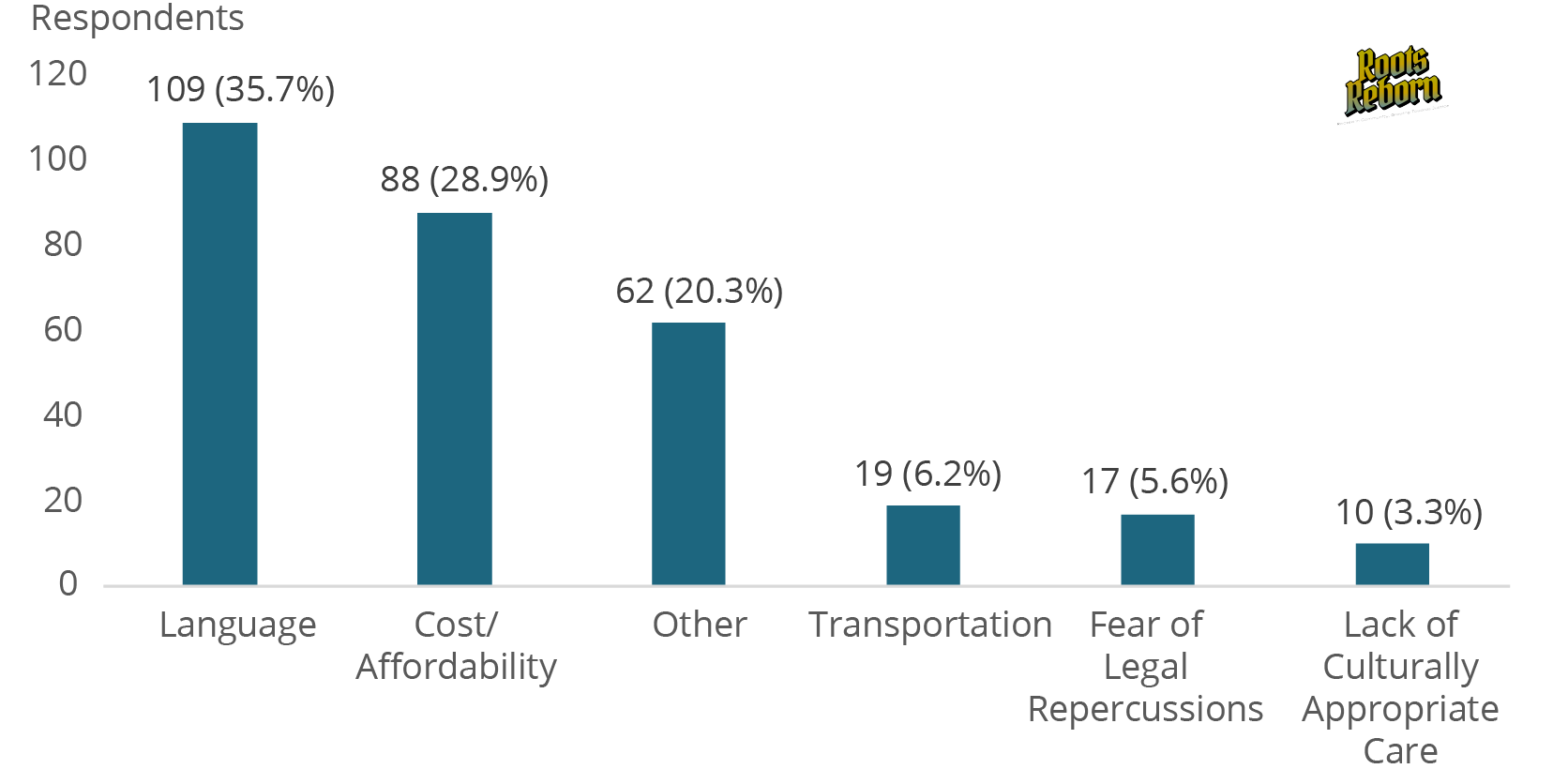
Support systems for aid after the Maui disaster were heavily layered. 14.7% relied on the Red Cross – Hotel Program alone, while 14.4% received both Red Cross and FEMA assistance, and 10.5% reported using Red Cross with DHS–GEM/AirBnB. In total, over 80% used multiple forms of aid, confirming that single-agency approaches were insufficient and pointing to the need for integrated, client-centered service networks.
5. Services and Training Needs
The data show that community members are not just identifying unmet needs—they are actively seeking out culturally relevant, community-based solutions. Respondents are looking for services that are delivered with trust, language access, and cultural understanding, not just generic assistance.
Top Program Areas with Strong Community Demand
- Tax Preparation Services – 144 respondents (50.3%) identified this as a top priority, highlighting the widespread need for financial literacy and support navigating complex systems.
- ITIN Registration – 93 respondents (32.5%) expressed strong interest, underscoring the demand for access to legal identity and tax compliance pathways.
- Group Therapy – 87 respondents (30.4%) indicated high interest in emotional healing, showing readiness to engage in trauma-informed, peer-based mental health care.
- Driver’s License Test Preparation – 87 respondents (30.4%) reported strong interest, reflecting a need for mobility, independence, and job access.
- English and Parenting Classes – Moderate but meaningful demand: 29.4% expressed high interest in English language programs, and 23.4% in Parenting classes, especially among families aiming for long-term integration and child development support.
- GED Preparation – 55.2% of respondents (158 individuals) marked it as least relevant, potentially reflecting current age distribution or alternative educational priorities.
Conclusion
The preliminary findings from Our Financial Future reveal not just the scale of unmet needs, but the resilience, clarity, and agency of Maui’s immigrant wildfire survivors. These are not passive recipients of aid; they are families actively seeking stability, healing, and opportunity. The data speak plainly: trauma persists, systems remain fragmented, and survival is still a daily challenge for many. Yet, within this adversity lies a roadmap for action. Roots Reborn has a critical role to play—not only as a service provider, but as a trusted anchor for rebuilding lives with dignity, cultural humility, and community voice at the center. As Maui moves from emergency to long-term recovery, these findings must catalyze a deeper commitment—from funders, policymakers, and partners alike—to build systems that are inclusive, equitable, and rooted in the lived realities of those too often left out of disaster narratives.
About Roots Reborn
Roots Reborn is a multicultural immigrant justice and disaster response organization dedicated to supporting migrant and immigrant communities on Maui. We do so in part by investing and pouring into raising young leaders from within our community-believing strongly in their capacity to drive change.
To learn more, visit us at: www.rootsreborn.org